English majors and their FSU Honors Program cohort share research at Oxford Consortium for Human Rights Workshop
By Abigail Botsford
Whitney Bouk and Molly Stinson never imagined themselves walking the historic halls of the University of Oxford in England, but they were able to share that experience in July 2025.
Bouk and Stinson were two of eight students from Florida State University’s Honors Program who participated in the Oxford Consortium for Human Rights.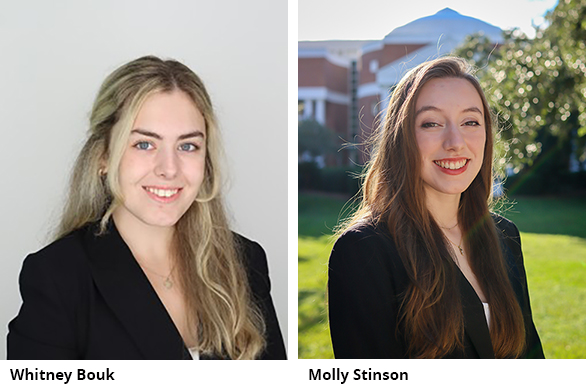
“We were living out the dream every day,” Bouk says about being in Oxford.
Bouk is a junior pursuing a dual degree in English-Editing, Writing, and Media and in Political Science, and Stinson is a senior with a double major in English-Editing, Writing, and Media and in Religion. Both students are pre-law.
This marked the fourth consecutive year that the university’s Honors Program has sent a cohort to Oxford. The consortium took place July 6-12, and this year’s theme was Human Rights and New Technology. Throughout the week, students viewed lectures and engaged in discussions on the ethical and societal impacts of emerging technologies.
Bouk and Stinson had the opportunity to interact with students from universities across the U.S. and the world. On the last day of the workshop, cohorts from each school delivered a presentation on their research project.
This year, the parameter set by Oxford for the student presentations was to identify a local silence breaker within their community. The consortium organizers described silence breakers as “those who have taken active measures and public stances to disrupt human rights violations.”
FSU’s presentation highlighted the campus chapter of Students Demand Action, a national organization of high school- and college-aged activists who work to address the issues of gun violence in the United States. They identified Students Demand Action as a local silence breaker following the April 17, 2025, shooting on FSU’s campus and incorporated how technology affects human rights.
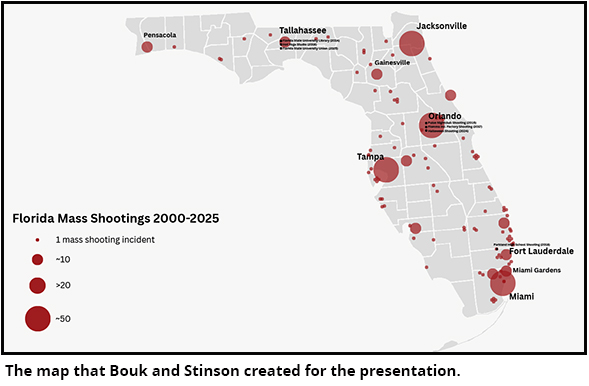
“We talked about the event that had happened, and how technology had shaped it,” Bouk says, adding that the presentation included the benefits of technology following the crisis. “Students Demand Action was able to bring the community together, scheduling events, and more.”
Bouk and Stinson created a map of mass shootings in America dating back to the year 2000, with the number of instances that have occurred in a city correlated to the size of a dot.
“There is no real comprehensive map of mass shootings in America—and there is also no solid definition of what a mass shooting is,” Stinson says. “There are individual, independent databases that track them, but it was up to us to condense things and put together a visual.” Recalling the presentation, Bouk and Stinson both spoke about how the other students reacted to their presentation and how the discussion had an impact on them.
“It was a bit cathartic to be able to speak about how we’ve survived that event, how we’ve reacted to it, and how, as a community, we’re stronger together,” Stinson says. “It was powerful. It was incredible to be able to present that in front of people at Oxford.”
Bouk and Stinson also were in charge of securing funding and scholarships for their cohort ahead of time, ensuring each student had the amount of funding they needed for the trip.
“Whitney and I took charge of writing applications for scholarships and trying to get funds for our group,” Stinson says.
Ross Moret, associate teaching professor in the FSU Honors Program, led the student cohort, and he also presented at the consortium. His talk, “Polarization and the Business of New Technology,” examined how digital platforms and economic incentives contribute to political division and influence human rights discourse.
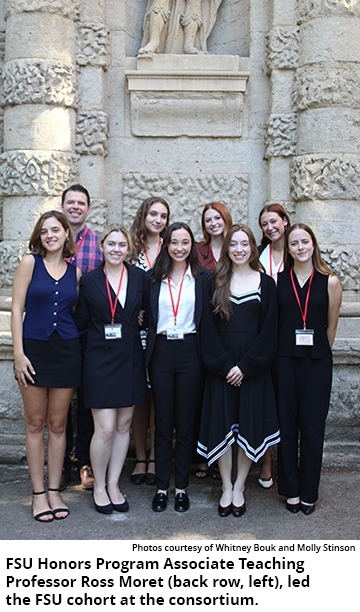
“Whitney and Molly made tremendous contributions to the cohort,” Moret says. “They worked together in collecting data on gun violence that became foundational for the group’s research project. They were also among the most active students in asking questions during lectures and talking with speakers afterwards.”
He added that he appreciated the way they made friends with students from other schools.
“Both of them embodied what the consortium is supposed to be,” he says, “and I’m so grateful that they are part of the group.”
Bouk and Stinson discovered the opportunity to attend the consortium through Moret, who they each had as a professor. He encouraged both students to apply.
Stinson applied as a sophomore, but she was not accepted into the cohort that year, saying she did not fit the cohort at the time. Moret encouraged her to apply again the following year; she followed through and was accepted.
Moret encouraged Bouk to apply when she was a student in one of his courses. She was intrigued after learning more about the consortium and decided to apply.
“This provided the dual opportunity of getting to know a group of FSU students better, and then also being able to get to know people from a ton of other universities, and being able to interact with the other professors, including ones at Oxford University,” Bouk says. “That was, to me, a really amazing opportunity.”
When talking about their experiences, Bouk and Stinson recall that when they arrived at Oxford, one of the more shocking aspects was realizing how broad the subject of artificial intelligence and human rights truly is. Stinson says that all the professors in attendance had different specialties, the students involved had different interests, and discussions ranged from the connections between neuroscience and AI to the relation between ethics and AI.
They appreciated how inclusive the experience was, which allowed for greater participation. In addition, Bouk and Stinson interacted with students who attend universities from other countries. For example, Stinson says she spoke with students from South Korea and learned more about North-South Korea relations.
They also met students from universities across the U.S.
“It was really great to see so many people from so many different regions across the U.S. and hear their perspectives that were partially shaped by their regions, and how they were very similar in a lot of ways,” Bouk says. “With the division that is broadcasted recently, it was great to see how there was a group of people from all over the country that can agree and work together while discussing issues that affect almost all of us.”
Both Bouk and Stinson found that their backgrounds as English majors came into play at the consortium.
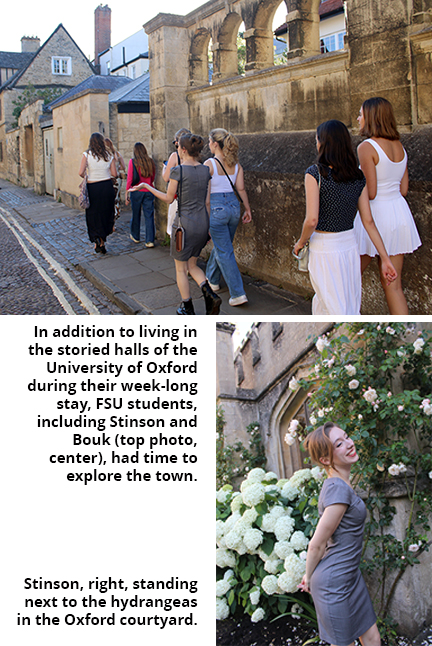 Bouk sat in on a presentation an Oxford professor gave that described the way AI functions. She realized that his theories matched many concepts she had learned in a rhetoric class she took in the Spring 2025 semester. She was able to link the scientific concepts about how AI works, as the professor described them, and the concepts learned in class.
Bouk sat in on a presentation an Oxford professor gave that described the way AI functions. She realized that his theories matched many concepts she had learned in a rhetoric class she took in the Spring 2025 semester. She was able to link the scientific concepts about how AI works, as the professor described them, and the concepts learned in class.
“I could never have predicted those two topics being connected, but I was able to have a better understanding and grasp what he was talking about because of the things that I’ve learned through English,” Bouk says.
Stinson says her English studies came in handy during the presentation on the last day of the consortium.
“I can’t overemphasize how important it is to know how to deliver information,” Stinson says. “So, when we were doing our presentation, especially for something so sensitive as gun violence, something that we had ourselves experienced, to be able to get that through a presentation, [speaking to] an audience with empathy, with sincerity, but also with objectivity.
“I think those English classes that we’ve taken really helped to push information out in the most effective way with the best rhetorical devices, and I think that made our presentation very effective.”
Bouk echoes Stinson’s sentiment about how knowledge from their English classes aided the overall experience.
“In every English class that I’ve taken, I’ve realized that our assignments, especially our exams, really do push critical thinking to the next level. You have to interpret your analysis,” Bouk says. “I think that when applied to the types of issues that are in the realm of human rights, where there are a lot of different variables, factors, and perspectives, having the skill to go through and be able to absorb that information and then interpret that information is invaluable.”
Bouk and Stinson both chose the English major’s editing, writing, and media track because it seems best tailored for students interested in attending law school.
“I felt that the editing, writing, and media track would familiarize me with lots of different types of documents, editing in general, and help improve my ability to notice little details,” Bouk says.
While the academic focus at the consortium was transformative and enriching for both students, the setting of Oxford added to the experience. They enjoyed the beauty and charm of the campus, from a courtyard full of gorgeous white hydrangeas to the kettles for tea that were supplied in each dorm. Stinson says that just being able to sleep, eat, sit, and live in the storied halls for a bit of time was wonderful
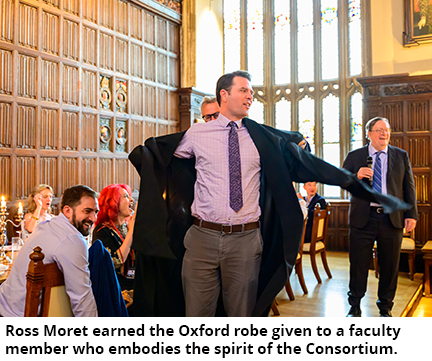 When they explored the city, they found fantastic, delicious food options, from Indian cuisine to meat pies.
When they explored the city, they found fantastic, delicious food options, from Indian cuisine to meat pies.
“I ate so much food that I gained weight,” Stinson says, laughing at the memories.
Bouk and Stinson encourage any English majors who are also in the Honors Program to apply to be a part of the next cohort.
“It’s like nothing else—do it, “Stinson says. “And if you don’t get it the first time, apply again.”
Each year at the end of the consortium, Hugo Slim, an Oxford professor and one of the founders of the Consortium, puts his Oxford robe on one of the faculty leaders. The criterion is that it’s given to a faculty member who embodies the spirit of the Consortium. This year, Moret was given the robe and as he accepted, the FSU cohort performed the school’s war chant.
“I do not think that the people running the Oxford program understood what was going on,” Bouk says. “But we did, and Dr. Moret did, and that’s what mattered.”
Abigail Botsford is a major in English-Editing, Writing, and Media, with a minor in communication.
Follow the English department on Instagram; on Facebook; and on X.
